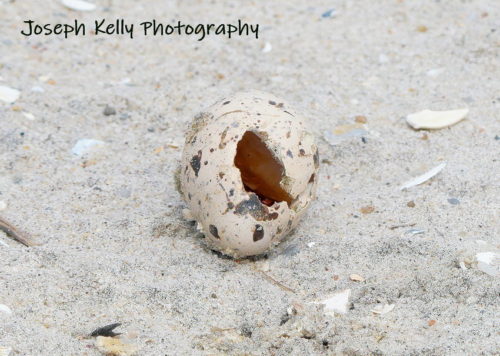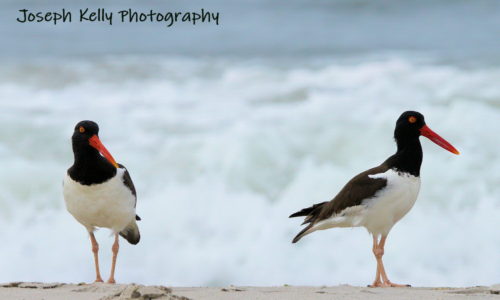Monday, July 27, 2020,
This post is a bummer. This photo is a bummer. The story behind this photo is a double bummer. This is a failed nest. That’s what we call a nest that has failed to produce any chicks.
This is an Oystercatcher egg that has been predated. Not predated as in the past tense but predated as in a predator has been at work here, although now, the promise that this nest once held is certainly in the past tense. By looks of it, I’m guessing the perpetrator was a gull of some sort. It’s hard to be sure because no one I know was witness to the attack.
I mentioned that this was a double bummer, and it is. You see, this single egg nest was the second attempt by this pair of Oystercatchers to nest this season. Their first nest, which was up in the dunes was predated as well. The possible suspects there include Raccoons and feral cats. When Oystercatchers suffer a nest failure they will often try again, which is what happened here. Second attempts at nesting are always small clutches. Instead of three or four eggs, a second nest will often contain only one or two eggs. This nest only had the one egg and it was in a terrible location.
After the initial nest failed the Oystercatchers built a second nest right in the middle of a busy section of beach. Perhaps they were over compensating after their failure in the dunes. Despite the fact that the Conservation Department had roped off the area, this nest was still in a lousy place. While it was beyond the tide line, it was nowhere near the dunes and in a heavily trafficked area. People could walk in front of it, behind it, and on either side. I had been monitoring this nest for several days and there was more than a few times when I saw folks setting up their towels and blankets just outside and even around the roped off area.
Whenever folks came nearby, the parents would walk away. Walking away is not a sign of bad Oystercatcher parenting. Rather, it’s a basic strategy that Oystercatchers follow so as not to draw attention to their eggs. In most cases, it’s a plan that works. However, when the beach is so crowded with humans and you stay away from your nest for extended periods of time, it leaves your nest open to predation. And some predators, especially gulls, are not at all shy around humans.
And so, sadly, this pair of Oystercatchers lost two nests in the same season. It was too late to attempt a third so they will have to wait till next spring to try again. I know it’s just nature and I know nature can be harsh but still, my heart is a little bit broken. JK
JK



Oh, that is a sad story. But I’m glad they will stay together. In that last picture they parents seem to be digesting all this and musing. It is a pretty shot with the surf behind them. I hope they are successful next year.
I hope that they learn from their mistakes this year and apply those lessons next breeding season. As you know, I am a big fan of these beautiful birds. JK.
Me too. Is this couple recognizable? Do they have bands so you know who they are?
Unfortunately neither of these Oystercatchers were banded. JK.
Bummer. 🙁